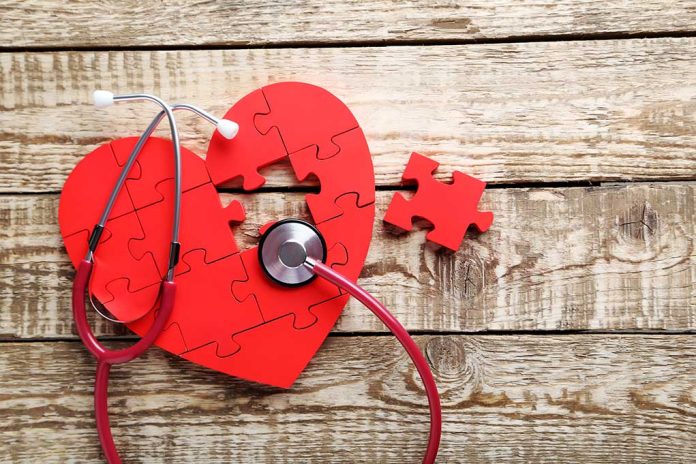
Dr. Evan Levine, a prominent cardiologist, warns that your favorite beverages could be secretly damaging your heart, but simple changes can dramatically improve your cardiovascular health.
At a Glance
- Starbucks Frappuccinos contain dangerously high levels of caffeine and sugar that can trigger heart issues
- Excessive alcohol consumption can lead to alcohol cardiomyopathy, a serious heart condition
- Sodas contribute to weight gain and increased triglycerides, significantly raising heart disease risk
- Energy drinks combine caffeine and sugar in ways that can provoke dangerous heart rhythms, especially in sensitive individuals
The Hidden Heart Dangers in Your Daily Cup
That morning coffee routine might be more problematic than you realize, especially if your preference leans toward specialty coffee drinks. Dr. Evan Levine, a cardiologist who has studied the relationship between beverages and heart health, specifically identifies Starbucks Frappuccinos as a significant risk factor. These popular drinks combine high caffeine content with substantial amounts of sugar, creating a potentially dangerous mixture for those with existing heart conditions.
Caffeine stimulates the central nervous system and releases free fatty acids from adipose (fat) tissue, potentially triggering various heart reactions. For those with certain heart conditions, this stimulation can provoke arrhythmias or irregular heartbeats. The American Heart Association notes that caffeine sensitivity varies widely among individuals, making it important to understand your personal reaction to these stimulants.
Alcohol’s Complex Relationship with Heart Health
The connection between alcohol and heart health is nuanced and often misunderstood. While moderate consumption might show some benefits in certain populations, Dr. Levine emphasizes that excessive drinking significantly damages cardiovascular health. Specifically, regular heavy alcohol use can lead to alcohol cardiomyopathy, a condition where the heart muscle weakens and cannot pump blood efficiently.
Johns Hopkins Medicine clarifies that while some studies suggest moderate alcohol consumption may be linked to lower heart disease risk, the causation remains unclear. What is definitively known is that excessive alcohol consumption is associated with high blood pressure, heart failure, stroke, and cardiomyopathy. The calorie content in alcoholic beverages also contributes to obesity, which further increases heart disease risk.
The Silent Damage from Sodas and Sweetened Beverages
Perhaps the most insidious threat to heart health comes from regularly consumed sodas and sugar-sweetened beverages. Dr. Levine points out that these drinks contain significant amounts of sugar that contribute to weight gain, increased triglyceride levels, and elevated diabetes risk – all major factors in developing heart disease. A single 12-ounce can of soda typically contains about 39 grams of sugar, far exceeding the American Heart Association’s recommended daily limit.
Regular consumption of these beverages creates a cascade of metabolic effects that cumulatively damage the cardiovascular system. The high fructose corn syrup found in many of these products has been specifically linked to increased risk of metabolic syndrome, a cluster of conditions that raise your risk of heart disease. Replacing even one sugary beverage per day with water can significantly improve long-term heart health outcomes.
Energy Drinks: A Perfect Storm for Heart Problems
Energy drinks represent what Dr. Levine considers the most concerning category of beverages for heart health. These products combine exceptionally high caffeine levels with sugar and other stimulants, creating what cardiologists describe as a “perfect storm” for cardiovascular problems. Jefferson Health reports that energy drinks can cause blood pressure spikes, accelerated heart rate, and even provoke dangerous heart rhythms in susceptible individuals.
The risks are particularly pronounced in people with underlying heart conditions or those who are sensitive to stimulants. The combination of ingredients in these beverages can significantly exceed safe consumption levels, especially when multiple drinks are consumed within a short period. Dr. Levine references cases where otherwise healthy young adults have experienced serious cardiac events after consuming energy drinks, underscoring the potential dangers these products present.
Making Heart-Healthy Beverage Choices
The good news is that simple substitutions can dramatically improve your cardiovascular health. Water remains the ideal choice for hydration, while unsweetened tea offers beneficial antioxidants without the risks of added sugars or excessive caffeine. For those who enjoy coffee, choosing plain brewed coffee without added sweeteners provides the benefits of antioxidants with manageable caffeine levels that most healthy adults can tolerate.
Dr. Levine and other heart specialists emphasize that individual responses to beverages vary significantly. Those with existing heart conditions, pregnant women, and individuals taking certain medications should consult with healthcare providers about safe beverage choices. Understanding your personal risk factors and making informed decisions about what you drink represents an accessible yet powerful way to protect long-term heart health.






















